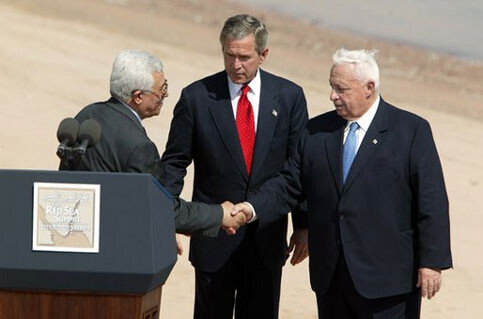The Chicago Tribune 6 June 2003

Above: Palestinian Prime Minister Mahmoud Abbas, President George W. Bush and Israeli Prime Minister Ariel Sharon after reading statement to the press during the closing moments of the Red Sea Summit in Aqaba, Jordan Jun 4, 2003. (White House/Paul Morse)
President Bush’s summit with Israeli Prime Minister Ariel Sharon and Palestinian Prime Minister Mahmoud Abbas in Aqaba, Jordan, ended this week on an upbeat note. But Sharon’s announcement that Israel will dismantle “unauthorized” settler outposts as its contribution to implementing Phase 1 of the “road map,” and his failure to announce a construction freeze in other settlements, is a sign that the initiative will quickly run aground unless Bush forcefully upholds his peace plan.
The “road map” requires Israel to stop all settlement construction immediately, and remove all new settlements built since March 2001. Israel’s Peace Now movement puts the number of such new settlements at 60, dozens more than the handful of outposts that Sharon considers to be “unauthorized” by his government.
Sharon’s failure to commit to the terms of Phase 1 of the road map contrasts with Abbas’ clear renunciation of “terrorism and violence against Israelis wherever they may be.”
The day before the Aqaba meeting, Bush declared that, “Israel must make sure there is a continuous territory that the Palestinians can call home,” and consequently “must deal with the settlements.”
Such statements are simply too vague to persuade Israel’s hard-line leaders to do more. After Bush’s statement in Sharm el-Sheikh, Ha’aretz quoted Israeli Deputy Prime Minister Ehud Olmert ruling out evacuating even “tens of thousands” of the hundreds of thousands of settlers, and claming, “this is unrealistic, and I don’t think the Americans are thinking of this.”
On the ground, Israel is moving ahead with plans to build massive new settlements, despite its nominal acceptance of the road map. Using Israel’s name for the occupied territories, Sharon’s housing minister, Effie Eitam, declared on June 2 that, “Praise the Lord, there is large natural growth in Judea and Samaria—just this year alone there has been a 5.5 percent increase in settlers.” Making clear that “natural growth” includes moving new settlers in from Israel, Eitam promised, “we will build for them, and provide them roads and infrastructure.”
And, just before the Aqaba summit, Israeli municipal authorities announced they are moving ahead with plans to build a new Jewish settlement in occupied East Jerusalem, to be called “Kidmat Tziyon” (meaning “the progress of Zion”). The plan calls for 230 Jewish-only housing units on 25 acres overlooking the future home of the Palestinian parliament.
Peace Now’s Yariv Oppenheimer condemned the Jerusalem project as “another attempt at preventing any solution on the Jerusalem issue by making a return of land to the Palestinians impossible.”
By defining a few of its smaller West Bank and Gaza settlements as “unauthorized” according to Israeli law, Israel hopes to distract attention from the major construction that is going ahead, and convey the impression that the vast majority of the settlements are somehow “legal” and therefore not a key issue.
In fact, for decades the international community has insisted that all of Israel’s settlements are illegal. President Jimmy Carter, who remains to date the most successful peacemaker between Israelis and Arabs, declared in 1980, “Our position on the settlements is very clear. We do not think they are legal, and they are obviously an impediment to peace.” The first President Bush understood this too, which is why in 1991 he successfully pressured Israel into negotiating with its Arab neighbors by threatening to withhold U.S. loan guarantees he feared would be used to build more settlements on Palestinian land.
The UN Security Council, in resolution 465 of 1979, determined “that the policy and practices of Israel in establishing settlements in the Palestinian and other Arab territories occupied since 1967 have no legal validity and constitute a serious obstruction to achieving a comprehensive, just and lasting peace in the Middle East.”
Despite universal recognition, even amongst a majority of Israel’s population, that Israel cannot have peace and colonies, Sharon continues to play a double game.
It is no surprise that vast differences remain between Israelis and Palestinians after the Aqaba summit. But if the new peace process is to survive long enough to address those differences, the first phase of the road map must be implemented in full. This means that Palestinians must do their utmost to fulfill their commitment to do everything they can to stop attacks on Israelis. But full Palestinian cooperation without Israel stopping and reversing the settlements won’t lead to peace, only to disillusionment and renewed conflict.
This article appeared in The Chicago Tribune on 6 June 2003.





